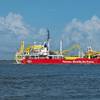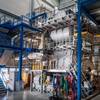Long discussed as the embodiment of next-generation marine technology, the Japanese "Techno-Superliner" (TSL) is now a reality. The 14,500 grt TSL will be built from aluminum and measure 460 x 98 ft. (140 x 29.8 m). To be built by Mitsui Engineering and Shipbuilding's Tamano works for delivery in 2005, the TSL will be propelled to a service speed of 38 knots via a pair of Rolls-Royce Kamewa VLW J235 waterjets, which will absorb 27 MW of power. The ship will carry 700 passengers and cargo along the 1,000 km route between Tokyo and Ogasawara Islands, with its speed helping to cut the journey time from 26 to 16 hours. "This contract is another example of our technological excellence providing our customers with a competitive edge," said Saul Lanyado, Rolls-Royce president - marine. "We have committed to extensive waterjet research, studying powers of up to 50MW to understand the upper limits of power likely to be needed for fast vessels in the next few years.
The Kamewa VLW J235s, to be built in Kristinehamn, Sweden and representing an approximate $7.5 million order, will measure 7.7 ft. (2.3 m) in diameter, compared with the current largest Kamewa size of 6.5 ft. (2 m) The VLW J235 is divided into a series of elements. Integrated into the hull structure is the inlet duct. To this and to the transom is bolted the impeller chamber. Outboard of this is the guide vane chamber and the steering and reversing unit, which is operated by a hydraulic steering actuator located inside the vessel and stem that protrudes downward from the compartment over the jet units. The impeller shaft is supported by a water lubricated bearing in the guidevane chamber, has the seal box at its inboard end on the inlet duct, and is supported within the hull by a split bearing. The massive thrust is taken by a separate thrust block in the hull, connected to the impeller shaft by a stub shaft and coupling.
Featured videos

Inside the Electrified Truckable Tug

Tracking Foreign Vessels Working in the U.S. Jones Act Market

Inmarsat Enhances Service to Drive Digitalization
Subscribe for
Maritime Reporter E-News
Maritime Reporter E-News is the maritime industry's largest circulation and most authoritative ENews Service, delivered to your Email five times per week









